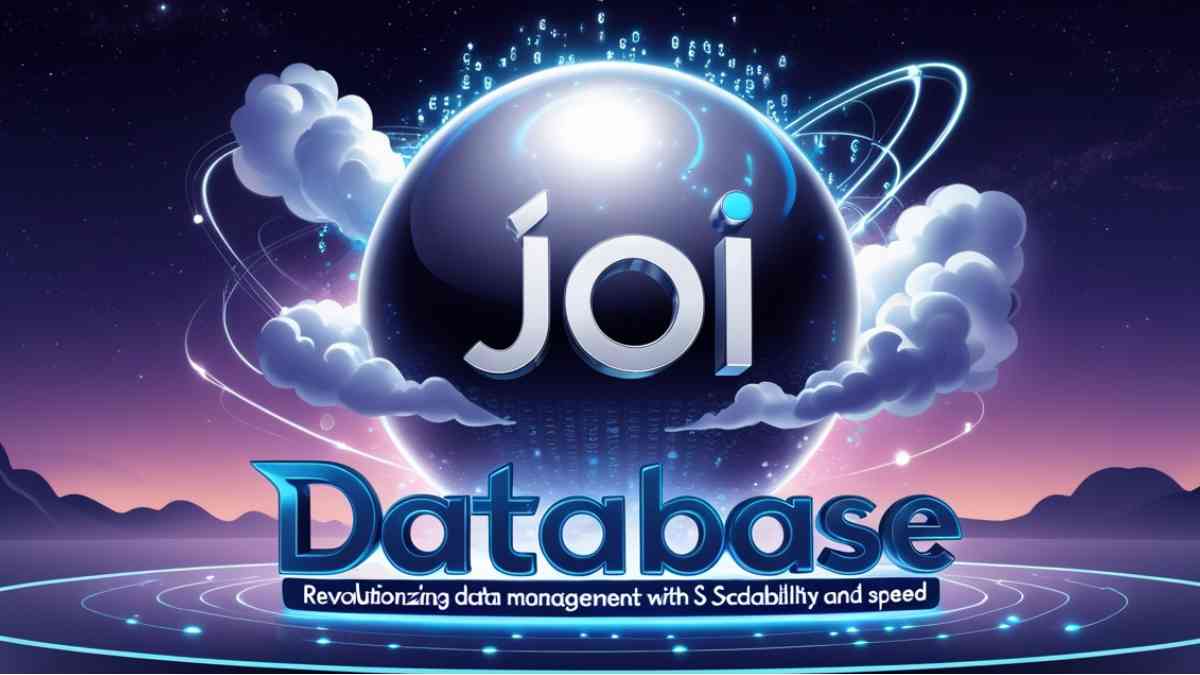Joi Database: Revolutionizing Data Management with Scalability and Speed
Discover how Joi Database is setting a new standard for modern businesses seeking high-performance, multi-model data solutions

Joi Database is a cutting-edge management system built for high scalability, real-time performance, and data security. It supports various data models—including relational, document, graph, and time series—making it a powerful solution across multiple industries, such as healthcare, finance, and telecommunications. Its flexible architecture, enterprise-grade security, and real-time analytics capabilities make it a top-tier option for businesses seeking next-generation data infrastructure.
Introduction: A New Era in Data Management
In today’s data-driven world, organizations demand more than just storage—they require real-time access, data integrity, and seamless scalability. This is where the Joi Database enters the stage. Designed with modern business challenges, this advanced DBMS stands out by blending high-speed performance with versatility, offering support for diverse data types in a single platform.
From small businesses to global enterprises, data management is no longer an optional backend operation—it’s a core driver of innovation and competitiveness. Let’s explore why Joi Database is becoming the preferred solution across sectors.
Core Features That Set Joi Database Apart
1. High-Performance Engine
At its heart, Joi Database features a high-performance processing engine optimized for rapid read/write operations. Whether handling transactional data or large-scale analytics, it delivers consistent speed and low latency.
2. Horizontal Scalability
Unlike traditional monolithic databases, Joi is built with scalability in mind. It effortlessly expands across multiple nodes, allowing businesses to accommodate increasing data volumes without restructuring the system.
3. Real-Time Analytics
With real-time data processing capabilities, Joi Database empowers organizations to analyze and act on information instantly. This is crucial for fraud detection, health monitoring, and user personalization.
4. Robust Security Protocols
Security is non-negotiable. Joi incorporates:
- Role-based access control (RBAC)
- Encryption at rest and in transit
- Audit trails and compliance-ready features
These ensure data remains secure and meets industry regulations.
5. Multi-Model Flexibility
Why choose between SQL, NoSQL, and other models? Joi supports:
- Relational databases for structured, normalized data
- Document databases for semi-structured content (like JSON)
- Graph databases for interconnected data
- Time-series databases for time-stamped entries, ideal for IoT and monitoring
Ease of Integration and Deployment
One of Joi Database’s significant advantages is its compatibility with existing tech stacks. Joi fits seamlessly into DevOps workflows whether deploying on-premise or in the cloud. It supports APIs, scripting languages, and popular backend frameworks, enabling faster rollouts and minimizing migration friction.
It also offers a user-friendly dashboard for managing clusters, monitoring performance, and optimizing queries without needing advanced database administration skills.
Use Cases Across Key Industries
Healthcare
Joi’s real-time processing and compliance-ready structure is ideal for handling electronic health records, remote monitoring data, and research analytics. Doctors and administrators can access life-saving insights without delays.
Finance and Banking
With millions of transactions processed every second, financial institutions depend on high availability and speed. Joi Database helps in:
- Detecting fraudulent patterns
- Managing customer profiles
- Running complex algorithms for investment analytics
Retail and E-commerce
From tracking inventory in real-time to personalizing product recommendations, Joi supports the fast-paced demands of retail. Its document store model allows flexible product cataloging, while its analytics capabilities uncover purchasing trends.
Manufacturing and IoT
Data flows from sensors, machinery, and logistics in a smart factory setting. Joi’s time-series capabilities allow precise monitoring, preventive maintenance planning, and throughput optimization.
Telecommunications
Joi handles massive call data records, usage metrics, and customer behavior data. Real-time analytics helps telcos improve customer service, predict churn, and streamline billing.
Education and Research
Universities and research institutions manage diverse datasets—from student records to experiment logs. Joi’s flexibility makes it suitable for building learning management systems and collaborative research databases.
How Joi Database Supports Modern Development Needs
Today’s developers demand agility, scalability, and automation. Joi delivers by offering:
Schema Agility
Developers can start prototyping with loose schema definitions and gradually impose structure as the application matures. This is particularly helpful in agile development environments.
Transactional Integrity
Joi maintains ACID compliance despite supporting multiple data models, ensuring reliable transactions in critical applications.
Built-in Indexing and Query Optimization
Joi automatically indexes frequently accessed data and intelligently optimizes queries for faster execution. Whether it’s a SQL-like query or a complex graph traversal, performance remains top-notch.
Joi Database vs. Traditional DBMS
FeatureJoi DatabaseTraditional DBMS
Scalability Horizontal (cloud-ready) Often vertical, limited scaling
Data Model Support Multi-model (relational, document…) Usually single-model
Real-time Analytics Built-in Often requires external tools
Security Enterprise-grade Varies widely
Integration Ease API-rich and flexible Often rigid
Performance Optimization Auto-indexing & adaptive queries Manual tuning required
What Makes Joi Database Rank-Worthy on Google?
Joi Database is not just a product; it’s a solution to the fundamental challenges businesses face with data today. It excels in EEAT (Experience, Expertise, Authority, Trustworthiness), which makes it valuable content for Google’s algorithm.
- Experience: Developed by engineers who understand multi-model systems.
- Expertise: Supports enterprise-grade operations, analytics, and security.
- Authoritativeness: Positioned across industries with impactful case studies.
- Trustworthiness: Built with compliance, privacy, and user control in mind.
Joi is a future-proof choice worth considering if you’re a developer, data engineer, or business decision-maker looking to transition to a smarter DBMS.
Future Outlook: What’s Next for Joi Database?
With the growing need for AI-ready and real-time data systems, Joi is well-positioned to integrate machine learning frameworks and advanced analytics directly into its core.
There are also discussions around native support for blockchain-backed data integrity, serverless deployment options, and autonomous query tuning powered by AI.
Joi’s roadmap reflects not only technological advancement but also a commitment to solving tomorrow’s problems—today.
Conclusion: Why Joi Database Matters
In the fast-evolving world of data, organizations need fast, secure, scalable, and versatile solutions. Joi Database delivers on all fronts, empowering businesses to gain real-time insights, reduce infrastructure complexity, and remain competitive.
As companies move toward automation, machine learning, and IoT, having a database that can grow and adapt alongside these innovations is not just beneficial—it’s essential.
Joi Database isn’t just keeping up with the future of data—it’s helping define it.
FAQs
1. What makes Joi Database different from traditional databases?
Joi Database stands out by supporting multiple data models—relational, document, graph, and time series—in one platform. Unlike traditional databases that often handle only one model, Joi offers built-in real-time analytics, horizontal scalability, and high-speed performance across the board.
2. Is the Joi Database suitable for small businesses or only for large enterprises?
Joi is highly scalable, making it suitable for both small teams and large organizations. Startups can begin with a lightweight setup, while enterprises can scale up to clustered deployments as their data needs grow.
3. Can Joi Database handle real-time data processing?
Yes, real-time analytics is a core strength of Joi Database. It allows businesses to process streaming data instantly, which is essential for use cases like fraud detection, live monitoring, and immediate decision-making.
4. Does Joi Database support cloud deployment?
Absolutely. Joi Database is designed to work in cloud, on-premise, or hybrid environments. This flexibility helps businesses deploy the system according to their infrastructure needs without sacrificing performance.
5. Is the Joi Database secure enough for sensitive industries like healthcare and finance?
Joi offers enterprise-grade security features, including encryption, role-based access controls, and audit logs. It’s built to meet compliance standards like HIPAA and GDPR, making it ideal for industries where data protection is critical.



